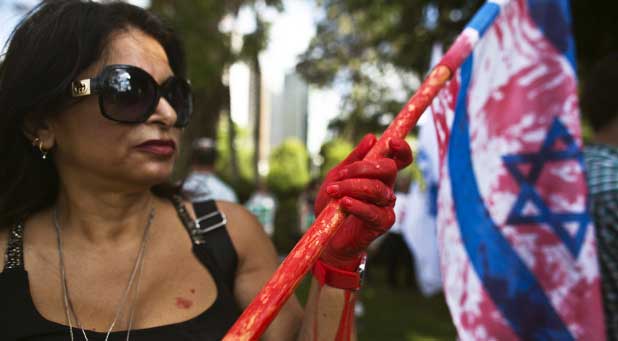Despite widespread public criticism and emotional pleas by bereaved families, 26 out of 104 Palestinian prisoners slated for early release will board buses and be taken to freedom under heavy security on Tuesday night.
The release of the 26 prisoners, who were all jailed for security-related crimes before the signing of the Oslo Accords in the mid-1990s, comprises the first of four stages of the prisoner release to which Israel agreed before the recent U.S.-brokered resumption of peace talks with the Palestinians.
The buses taking the prisoners out of Israel to Gaza or Judea and Samaria will be heavily secured by Israel Prison Service vehicles. Twelve prisoners will be dropped off at the Erez checkpoint en route to Gaza, while the remaining 14 prisoners will be dropped off at the Beitunia checkpoint to return to their homes in Judea and Samaria.
On Monday, as the names of the 26 prisoners were finalized, the Israel Prison Service gave them final medical examinations in the presence of Red Cross representatives.
President Shimon Peres was expected to sign the pardons of several of the prisoners by the end of the day. In accordance with the government decision, Peres was to sign pardons for prisoners who were tried by military courts in Gaza or in civilian courts in Israel. The prisoners tried in other military courts will be pardoned by the defense minister or the general officer commanding-in-chief central command.
As the prisoners were undergoing the final stages of their release, dozens of Israelis, many of them relatives of the victims of terror attacks perpetrated by the men slated for early release, demonstrated at the Defense Ministry building in Tel Aviv. The protesters dipped their hands in red paint to symbolize the blood on the terrorists’ hands, waved signs reading “Have we gone mad? We don’t release murderers,” and carried photos of their deceased loved ones. They also yelled out slogans such as “For every terrorist released, another Israeli child will die,” and one demonstrator even read the traditional Kaddish mourning prayer over the future deaths of Israelis who would “fall victim to the government’s cowardice,” as he put it.
‘A Death Sentence to All Terrorists’
“They are going to release my son’s murderers,” cried out Miriam Tubol, whose son, Lior, was kidnapped and murdered in Jerusalem in 1990. “To me, this is not a government. They are traitors. They will celebrate and dance on the blood of our children.”
Oded Karamani, whose brother Ronen was killed in the same attack that took Lior Tubol’s life, said, “They are killing our loved ones a second time. Our wound has been reopened; our hearts are bleeding. For me, this is tantamount to confirming the murder of a brother.”
MK Ayelet Shaked (Habayit Hayehudi), who attended the demonstration, called on the state to sentence terrorists to death.
“It is an embarrassment that a sovereign state is releasing murderers in exchange for nothing,” she said.
Dr. Gila Molcho, whose brother, Ian Feinberg, was murdered in Gaza in 1990, could not stop her tears.
“It is to open our wounds in the cruelest way possible,” she said. “The message we are communicating is that my brother’s memory and his blood are being given away as a gesture. It doesn’t make sense that we are giving all that just so that they [the Palestinians] will sit down to talk to us. In the case of Gilad Schalit [the Israeli soldier whose release from Hamas captivity was secured in 2011 in exchange for the rleease of more than 1,000 Palestinian prisoners], I closed my ears, shuttered my heart and said that even if I pay a personal price, it is worth it—the freedom of a soldier. This time, I can’t keep my mouth shut.”
Within the government, harsh criticism of the release could also be heard. Housing and Construction Minister Uri Ariel (Habayit Hayehudi) said Monday, “Terrorists belong in prison. Otherwise the state is simply mocking its own legal system, which sentenced these killers to long jail terms. The terrorists slated to be released have murdered women and children, and I don’t understand how releasing murderers can advance peace.”
The families of the victims also asked the High Court of Justice to issue an injunction to postpone the release until the court addressed their petition to prevent the release altogether. The court reviewed the petition three days ago and on Tuesday issued a ruling rejecting the appeal, clearing the way for the release later in the day.
“Our hearts are with the families of the victims of the terror attacks. Their pain is enormous, and we do not have the tools to heal it,” the justices wrote in their ruling. “The decision to free the prisoners, specifically the prisoners serving out long sentences for serious crimes, is a very difficult decision.”
“We are convinced that the authorized bodies made this decision with a heavy heart, taking the pain and standpoints of the bereaved families into consideration,” they wrote. “We didn’t find any flaws with the government’s decision.”
For the original article, visit israelhayom.com.















































